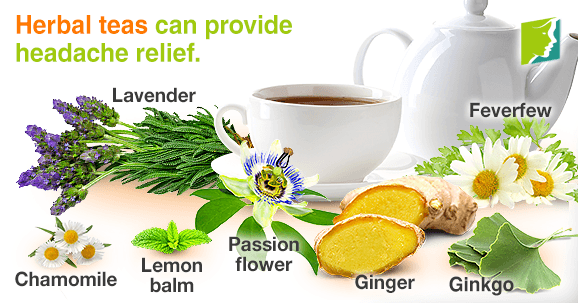Women are five times more likely to get headaches than men, which can be linked to hormone fluctuations. Headaches can be triggered by a number of things. They are caused by the constant dilating and constricting of blood vessels, and can range from mild to severe. While there are many medications for headache relief available today, many prefer to go the all-natural route with herbal teas. Herbal teas are generally inexpensive and can provide headache relief. Here are some of the most beneficial herbal teas for treating headaches.
Chamomile
Chamomile is a soothing herb, and it has compounds that helps relax tense muscles and ease pain. Chamomile is anti-inflammatory, making it beneficial for reducing inflammatory pain. Brew up a cup using one chamomile tea bag to a cup of just-boiled water.
Ginger
Ginger is a wonderful root that offers numerous health benefits. Ginger helps reduce pain by inhibiting prostaglandin synthesis, and also combats nausea, stomachache, arthritis, and cold and flu symptoms by reducing histamine, the compound that triggers a runny nose and related symptoms.
Feverfew
Feverfew is a popular herb for treating headaches because it is anti-inflammatory and helps reduce the frequency of headaches by preventing the blood vessels from constricting.
Ginkgo
Ginkgo is anti-inflammatory and antispasmodic, which has been known to help relax the muscles and improve circulation. It is also rich in antioxidants.
Lavender
Lavender is a soothing and sedative herb that can help relieve tension. In addition to lavender tea, adding lavender oil to a hot bath or to a cold compress for the forehead is known to help relieve headaches and stress.
Lemon Balm
Lemon balm is another helpful herbal remedy for headaches because it possesses calming and sedative characteristics. Lemon balm is part of the mint family, and is typically taken in combination with other herbs when treating headaches.
Passion Flower
Passion flower is a plant that has been used to treat sleep disorders, night sweats, anxiety, and gastrointestinal disorders. Passion flower has relaxing properties, so it can also help treat headaches.
Skullcap
Skullcap has been known to help ease muscle tension and twitching because it is antispasmodic and anti-inflammatory in nature.
Green Tea
Green tea is good for treating headaches and nausea. It is soothing and antioxidant.
All of these herbal teas should be available at specialty health food stores or online. Herbal teas are a natural alternative to over-the-counter medications. It is helpful not only to treat headaches at the source, and but also to examine your lifestyle and avoid things that may be causing headaches. Excessive alcohol,caffeine,and salty foods are also major headache triggers that are best avoided. Additionally, it is important to maintain an active lifestyle and healthy diet in order to prevent headaches from occurring.
There are also other approaches to treat headaches.
Sources
- Gladstar, R. (2012). Rosemary Gladstar's Medicinal Herbs: A Beginner's Guide. Storey Publishing.
- National Health Service UK. (2014). Migraines - Causes. Retrieved on November 28, 2014, from http://www.nhs.uk/conditions/migraine/pages/causes.aspx




